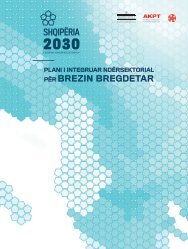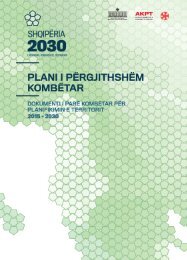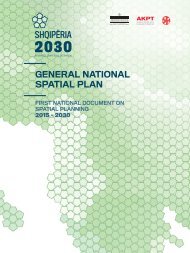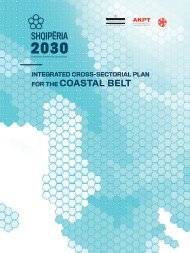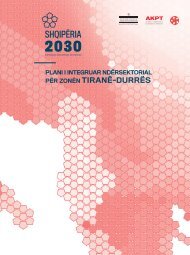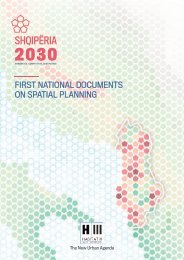Integrated Cross-Sectorial Plan of Tirana-Durres Area
The Albanian Government and the National Spatial Plan have identified the Tiranë-Durrës area, as one of the most important economic areas of the country, and of the Balkan region. To ensure a sustainable territorial and urban development of this area, the Ministry of Urban Development in cooperation with the National Territorial Planning Agency has taken the initiative to draft a Cross-sectoral Integrated Plan for the economic area Tiranë – Durrës. The metropolitan region under study includes territories administered by 5 municipalities: Tiranë, Durrës, Vorë, Shijak, Kamëz.
The Albanian Government and the National Spatial Plan have identified the Tiranë-Durrës area, as one of the most important economic areas of the country, and of the Balkan region. To ensure a sustainable territorial and urban development of this area, the Ministry of Urban Development in cooperation with the National Territorial Planning Agency has taken the initiative to draft a Cross-sectoral Integrated Plan for the economic area Tiranë – Durrës. The metropolitan region under study includes territories administered by 5 municipalities: Tiranë, Durrës, Vorë, Shijak, Kamëz.
Create successful ePaper yourself
Turn your PDF publications into a flip-book with our unique Google optimized e-Paper software.
EP3- Develop SMEs and innovation<br />
The metropolitan region represents a primary<br />
pr<strong>of</strong>ile in the economic development <strong>of</strong><br />
enterprises within Albania. It also plays a key<br />
role in the national economy. It is important<br />
that investments be given a priority to boost<br />
competitiveness in the region and ensure<br />
that SMEs play a leading role in achieving<br />
economic growth, by diversifying the range <strong>of</strong><br />
export-oriented products and services.<br />
The business environment needs to be<br />
developed to meet the needs <strong>of</strong> regional<br />
SMEs, by providing a dynamic and stimulating<br />
climate for actors’ interactive engagement.<br />
The first step is to create a climate <strong>of</strong> trust<br />
and security toward innovation, with mediumterm<br />
and long-term policies for domestic and<br />
foreign companies. The development <strong>of</strong> the<br />
regional enterprise environment will require<br />
some <strong>of</strong> the mechanisms to be activated and<br />
made efficient in order to achieve:<br />
1. Specialized training and knowledge on<br />
human resources, as per priority sectors;<br />
2. Development <strong>of</strong> horizontal and vertical<br />
interaction networks <strong>of</strong> the economy, to<br />
interact at a global scale;<br />
3. Territorial development organized in the<br />
poles, corridors and areas that support the<br />
interaction <strong>of</strong> SMEs.<br />
EP3.1- Develop human capacities<br />
Skills and technical knowledge are essential<br />
for SMEs to support and enhance the diversity<br />
<strong>of</strong> enterprise activities, to develop productivity<br />
levels, and to stimulate and guide innovation<br />
in business ventures. The plan promotes the<br />
establishment and development <strong>of</strong> specialized<br />
education and employment centres, as<br />
follows:<br />
- Develop specialized employment centres<br />
with focus on development in priority areas<br />
for each municipality.<br />
These centres should closely act with<br />
university programs and courses to<br />
develop SMEs innovation and regional<br />
entrepreneurship. It is suggested that these<br />
centres provide pr<strong>of</strong>iled knowledge on<br />
certain market segments. This approach to<br />
expand specialized knowledge should be set<br />
up closely linked with cluster development<br />
frameworks;<br />
- Develop centres and platforms for<br />
vocational training courses, focused on<br />
the development <strong>of</strong> lifelong knowledge and<br />
skills. They and their development programs<br />
should be closely linked to the SMEs and<br />
entrepreneurship development board. The<br />
role they can play can be more efficient if<br />
there is a cooperation with incubators and<br />
business accelerators;<br />
- Develop regional training platforms on the<br />
areas <strong>of</strong> green economy, smart economy and<br />
innovation;<br />
- Consult and instruct entrepreneurship,<br />
based on the development <strong>of</strong> school curricula<br />
with this approach;<br />
- Develop mixed policies, combining funding<br />
and consultations, access to specialists<br />
<strong>of</strong> strategic sectors in the network <strong>of</strong><br />
international pr<strong>of</strong>essionals;<br />
- Develop programs and projects that<br />
support new generation interconnection<br />
with the global entrepreneurship network<br />
from specialized centres, based on start-up<br />
business models.<br />
EP3.2- Enterprise interaction networks<br />
for innovation<br />
The creation and development <strong>of</strong> regional<br />
economic agencies should be carried out in<br />
order to create support networks for clusters<br />
and business incubators development,<br />
as well as to enable a connection among<br />
collaborative structures to foster the global<br />
value chain. The aim is to interconnect these<br />
institutions in a network and through common<br />
electronic platforms that will increase the<br />
efficiency <strong>of</strong> their interaction, based on<br />
regional strategies. Collaboration <strong>of</strong> these<br />
actors can be guided by a joint regional board,<br />
supported by the Regional SMEs Support<br />
74









